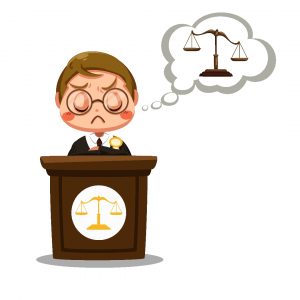Facts, issues and decision of the court in Nzekwu v Nzekwu: Land is one of the most important means of production, a business cannot exist if it has no land to situate its office or factory. Land is also one of the best ways to invest and store value, this is so because land is finite (you can’t make more land). Apart from businesses, individuals and members of each community require land in other to farm or build residential places so they can provide shelter for their families loved ones. To ensure that the society does not desolve into anarchy the law has provided the society with laid down guidelines and regulations to enable them in establishing ownership of land & other properties, this is to prevent a situation where by an individual would try to covert land belonging to another person.
One of such laws enacted to help protect ownership is the law against trespass, a person in possession of a property has the right to sue anyone who enters onto the said land without permission, this means that for one to succeed In a suite against a potential trespasser he or she must be in possession of the said property. There is also the question of succession when it comes to land matters, who gets to inherit the property of a deceased individual who is married?

Most communities in nigeria have customs and traditions which they tend to observe and follow before the advent of colonialism and the subsequent introduction of English laws. The new laws however did not fail to recognize the existence of these customs, for the customs to apply they must be proved to exist at the time they’re sought to be applied as well as judicially noticed by a court of superior record.
A custom would not be judicially noticed by a court of superior record if the said custom is repugnant to equity, good conscience and natural law. A good example of a repugnant law would be any law that seeks to strip a widow of the right to inherit her husband property during her lifetime. These issues were present in the case of Nzekwu v Nzekwu which would be analyzed below.
Recommended: Facts, issues and decision in Mojekwu v mojekwu
Issue raised in Nzekwu v Nzekwu (1989)
Whether a plaintiff not in possession of a property can sue for trespass?
Also see: Countries with the best judicial system in the world 2022
Facts of Nzekwu v. Nzekwu (1989) 2 NWLR (Pt. 104) 373
The plantiff in this case had approached the Onitsha division of the Anambra high Court to sue the said defendant for recovery of possession of a certain property. The plantiff also sought an injunction from the court restraining the defendant from trespassing on the said property.

The plantiff in this case was the widow of a certain Daniel Nzekwu who had died in the northern city of jos. The plantiff husband happened to be an uncle to the 1st defendant and also the junior brother if a certain Nathaniel Nzekwu. The plantiff husband, the 1st defendant father and Nathaniel Nzekwu were all sons of Nzekwu ojudu who had died in 1906. Nathaniel Nzekwu own son has been missing for a number of years, this then the 1st defendant diokpa.
The patriah of the family Nzekwu ojudu had many landed properties spread all around Onitsha, including the one in question at 8 cole Street Onitsha. At the time a certain Sierra – Leone had been renting the 8 cole Street Onitsha from Nzekwu ojudu to use as place of residence for himself and his lover. The tenant had erected a thatched house on the property, when the tenant had returned to to his home country, the plantiff and her husband moved into the property where they resided until they relocated to the northern part of Nigeria.
Recommended: How to sue someone in a different country
When the plantiff husband died in jos, she returned to Onitsha and continued to reside in the same 8 cole Street. She rented parts of the land out to tenants, she also paid the required dues and rates on the land. She left the property during the outbreak of the Nigerian Civil War, when she returned, the house on the property was left in ruins. She had cleared the debris, when she returned she found the 2nd defendant on the land who claimed that it had been sold to him by the 1st defendant. The 2nd defendant sold the house again to the 3rd defendant, prompting the plantiff to institute an action in court to recover the premises.
When the case came before the trial court at Onitsha, the court after hearing both arguments by both parties in the matter ruled in favor of the plantiff. The defendant who was dissatisfied with the decision of the trial court Judge approached the court of appeal to have the judgment of the court quashed. The court of appeal however equally sided with the plantiff upheld the decision of the trial court.
Recommended: How To Develop a Good Sense Of Humor: 11 Tips
The case then came before the Supreme Court, at this time the plantiff in question was already deceased. The court here was quick to point out that the right action for the plantiff should have been for recovery of possession not tresspass given that she was not in possession of the property at the said time.
The Supreme Court equally highlighted the Onitsha custom which provides that a widow has a right to live in her deceased husband property for the remainder of her life, so long as she remains of good behavior that is she doesn’t try to alienate without the permission of the husband family. The court equally pointed out that any custom which seeks to take away a widows right to occupy the house or property of her deceased husband was repugnant to equity and good conscience.
The court decided that the plantiff had only the right to occupy the property for life not full possession. The court equally stated that its decision would not in anyway affect the rights of the 2nd and 3rd defendant, the court equally awarded N500 to both parties.
Recommended: Habits of successful students explained
Decision of the court in Nzekwu v Nzekwu (1989)
The plantiff had approached the Onitsha division of the Anambra high Court for a recovery of possession of a certain property at 8 cole Street Onitsha, she equally sought an injunction against the 1st defendant who was the nephew of her husband, the 2nd and 3rd defendants who had purchased the said property from 1st defendant. She claimed that the land on question belonged to her husband and as such she had a right to occupy it after his death.

The trial court ruled in her favor, the defendant dissatisfied with the ruling approached the court of appeal who equally agreed with the decision of the trial court. The Supreme Court held that the plantiff had a right to occupy said property for life but not full possession of it. It equally ruled that its decision would in no way affect the action of the second and third defendant.

Edeh Samuel Chukwuemeka, ACMC, is a lawyer and a certified mediator/conciliator in Nigeria. He is also a developer with knowledge in various programming languages. Samuel is determined to leverage his skills in technology, SEO, and legal practice to revolutionize the legal profession worldwide by creating web and mobile applications that simplify legal research. Sam is also passionate about educating and providing valuable information to people.